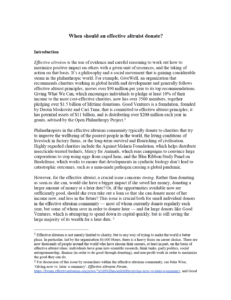When should an effective altruist donate?
William MacAskill (Global Priorities Institute, Oxford University)
GPI Working Paper No. 8-2019, published as a chapter in Giving in Time
Effective altruism is the use of evidence and careful reasoning to work out how to maximize positive impact on others with a given unit of resources, and the taking of action on that basis. It’s a philosophy and a social movement that is gaining considerable steam in the philanthropic world. For example, GiveWell, an organization that recommends charities working in global health and development and generally follows effective altruist principles, moves over $90 million per year to its top recommendations. Giving What We Can, which encourages individuals to pledge at least 10% of their income to the most cost-effective charities, now has over 3500 members, together pledging over $1.5 billion of lifetime donations. Good Ventures is a foundation, founded by Dustin Moskovitz and Cari Tuna, that is committed to effective altruist principles; it has potential assets of $11 billion, and is distributing over $200 million each year in grants, advised by the Open Philanthropy Project. [...]
Other working papers
Time Bias and Altruism – Leora Urim Sung (University College London)
We are typically near-future biased, being more concerned with our near future than our distant future. This near-future bias can be directed at others too, being more concerned with their near future than their distant future. In this paper, I argue that, because we discount the future in this way, beyond a certain point in time, we morally ought to be more concerned with the present well- being of others than with the well-being of our distant future selves. It follows that we morally ought to sacrifice…
Existential risk and growth – Leopold Aschenbrenner (Columbia University)
Human activity can create or mitigate risks of catastrophes, such as nuclear war, climate change, pandemics, or artificial intelligence run amok. These could even imperil the survival of human civilization. What is the relationship between economic growth and such existential risks? In a model of directed technical change, with moderate parameters, existential risk follows a Kuznets-style inverted U-shape. …
Is Existential Risk Mitigation Uniquely Cost-Effective? Not in Standard Population Models – Gustav Alexandrie (Global Priorities Institute, University of Oxford) and Maya Eden (Brandeis University)
What socially beneficial causes should philanthropists prioritize if they give equal ethical weight to the welfare of current and future generations? Many have argued that, because human extinction would result in a permanent loss of all future generations, extinction risk mitigation should be the top priority given this impartial stance. Using standard models of population dynamics, we challenge this conclusion. We first introduce a theoretical framework for quantifying undiscounted cost-effectiveness over…

